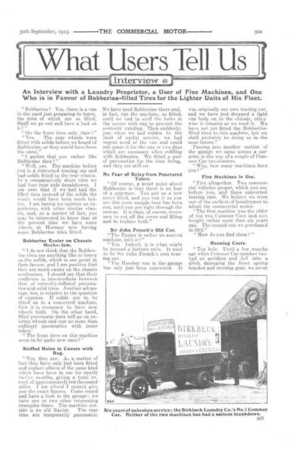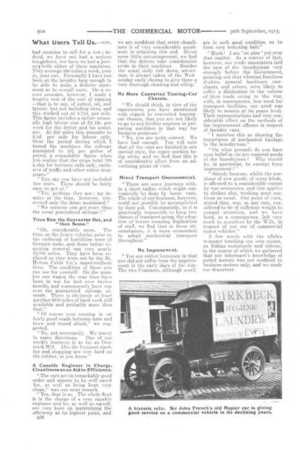What Users Tell Us
Page 11

Page 12

If you've noticed an error in this article please click here to report it so we can fix it.
Interview 40 An Interview with a Laundry Proprietor, a User of Five Machines, and One Who is in Favour of Rubberine-filled Tires for the Lighter Units of His Fleet.
" Rubberine Yes, there is avan in the yard just preparing to leave, the tires of which are so filled. Shall we go out and have a look at it?"
" On the front tires only, then'? "
"Yes. The rear wheels were fitted with solids before we heard of Rubberine, or they would have been the same."
"I gather that you rather 'like Rubberine then?"
" Well, yes. The machine before you is a converted touring car and had solids fitted to the rear wheels.
In a comparatively short time we had four rear axle breakdowns. I am sure that if we had had the filled tires instead of the solids the result would have been much better. I am basing my opinion on experiences with other similar chas sis, and, as a Matter of fact, you may be interested to know that at
the present tiine we have some wheels • at. Hornsey now having some Rubberine tires fitted.
Rubberine Easier on Chassis MechaT•i4 " T do not think that the Rubberine tires are anything like so heavy as the solids, which is one point in their •favour, and Iam positive that they are much easier-Cm the chassis mechanism. I should say that their resilience is intermediate between that of cOrrectly-intlated pneumatics and solid tires. Another advantage, too, is relative to the question of expense. If solids are to be fitted on to a converted machine, then it is necessary to have new wheels built. On the other hand, filled pneumatic tires will go on existing wheels and cost no more than ordinary pneumatics with inner tubes.'" " The front tires on this machine seem to be quite new ones ?"
Stuffed Holes in Covers with . Rag.
"Yes, they are. A8 a matter of fact they have only just been fitted and replace others of the same kind which have been in use for nearly twelve months, giving a total record of approximately ten thousand miles. I am afraid I cannot give you the exact figures. Come round and have a look in the garage ; we have one or two other interesting examples there. The machine out side is an old Napier. The rear tires are temporarily pneumatic. We have uesd Rubberine there and, in fact, ran the machine, so fitted, until we had to stuff the holes in the covers with rag to preventthe contents' exuding. Then suddenly, just when we had ridden to the limit of useful service, we had urgent need of the van and could not snare it for the one or two days which are necessary when refilling with Rubberine. We fitted a pair of pneumatics for the time being, and they are still on.
No Fear of Delay from Punctured Tubes.
" Of course, a great point about Rubberine is that there is no fear of a puncture. You put on a new cover filled, and you run it as you see this worn sample here has been run, until you are right through the canvas. It is then, of course, necessary to cut off the cover and filling and to replace both."
Sir John French's Old Car.
• "The Napier is rather an ancient machine, isn't it 2 "
" Yes. Indeed, it is what might be termed a historic relic: It used to be 'Sir John French's own touring car.
"The Humber van in the garage has only just been converted. It was originally our own touring car, and we have just dropped a light van body on to the chassis, otherwise it remains as we used it. We have not yet fitted the Rubberinefilled tires to this machine, but we shall probably be doing so in The near future."
Passing into another section of the garage we came across a surprise in the way ora couple of Coramer Car two-tonners.
" Why, how many machine& have you ? "
Five Machines in Use.
"Five altogether. Two commercial vehicles proper, which you see before you, and three converted touring cars. We believe we were one of the earliest of laundrymen to adopt the commercial motor.
"The first machine was the older of the two Co-miner Cars andelNa8 bought rather more than six years ago. The second one we purchased in 1912."
"How do you find them?"
Running Costs.
" Top hole._ Until a few months age when Commer Car number two had an accident and fell into a ditch. damaging the front spring bracket and steering gear, we never
had occasion to call for a tow ; indeed, we have not had a serious brea,kdown, nor have we lost a journe4 with either of these machines.. Thr4 average 250 miles a week, year in, year out. Personally I have not been at the laundry long enough to he able to make a definite statement as to overall costs. On a recent occasion, however, I made a lengthy test of the cost of running —that is to say, of petrol, oil, and labour, but not including tires, and. this worked out at. 3.71d. per mile. This figure includes a rather unusually high labour cost of £2 12s. per week for the driver and his assistant. At 250 miles this amounts to 2.5d. per mile for labour only. Over the period during which I tested the machines the mileage amounted to 10i per gallon or petrol, a remarkable figure when you realize that the stops total 120 a. day for business calls only, exclusive of traffic and other minor stoppages."
" You say you have not included tire costs. These should be fairly easy to get at."
" Yes, perhaps they are ; my inquiry at the time, however, concerned only the items mentioned."
"We suppose you get more than the usual guaranteed mileage?"
Tires Run the Guarantee Out, and " then Some."
." Oh, considerably more. The fires on the heavy vehicles prior, to the outbreak of hostilities were of German make., and these before requiring renewal ran very nearly 18,000 miles. They have been replaced as they wore out by the St. Helens Cable Co.'s super-resilient tires. The condition of these you can see for yourself. On the number one wagon the rear tires have been in use for lust over twelve months and consequently have run over the guaranteed mileage already. There is obviously at least another 5090 miles of hard work still available and probably more than that."
" Of course your running is on fairly good roads between here and town and round about," we suggested.
"No, not necessarily. We travel in ninny directions. One of our weekly journeys is as far as Denmark Hill. Also the frequent starting and stopping are very hard on the rubber, as you know."
A Capable Engineer in Charge. Cleanliness as an Aid to Efficiency.
"The ears are in remarkably good order and appear to be well cared for, as well as being kept very clean,Y was our next remark.
"Yes, that is so. The whole fleet is in the charge of a very capable engineer and he, as well as myself, are very keen on maintaining the efficiency at its highest point, and B38 we are confident that strict cleanliness is of very considerable assistance in attaining this end. Given some little encouragement, we find that the drivers take considerable pride in their machines. Besides the usual daily rub down, advantage is always taken of the Wednesday early closing to give them a very thorough cleaning and oiling."
No More Converted Touring-Car Chassis.
" We should think, in view of the experiences you have mentioned with regard to converted touringear chassis, that you arc not likely to go to any further expense in preparing machines in that way for business purposes."
"No, you are quite correct.. We have had enough You will note that all the vans are finished in one special style, the upper portion being white, and we find that this is of considerable effect from an advertising point of view.
Mixed Transport Uneconomical.
"There are some journeys within a short. radius which might conveniently be done by horse vans. The whole of our business, however, could not possibly be accomplished by their aid. Consequently, as it is practically impossible to keep two classes of transport going, the adoption of horses meaning duplication of staff, we find that in these circumstances, it is more economical to adopt mechanical transport throughout."
No Impressmvot.
"You are rather fortunate in that you did not suffer from the impressment in the early days of the war. The two Commers, although small, are in such. good.condition as to form very tempting bait," "Hush! I am 'on pins' yet over that matter. As a matter of fact, however, our trade association laid the case of the laundryman very strongly before the Government, pointing out that whereas furniture dealers, general hardware merchants, and others, were likely to suffer a diminution in the volume of their trade owing to the war, with, in consequence, less need for transport facilities, our need was likely to remain at its peace level. Their representations had very considerable effect on the methods of the impressment officers in respect of laundry vans.
" I mention this as showing the importance of mechanical haulage to the laundryman."
'On what grounds do you base your belief in the pre-eminent needs or the laundryman? Why should he, in. particular; be exempt from impressment?"
" Simply because, whilst the purchase of new goods, of many kinds, is affected to a considerable extent by war economics, and this applies to clothes also, washing must continue as usual. Our point of view, stated thus, was, at. any rate, considered to be of sufficient weight to compel attention, and we have been, as a consequence, left very much to ourselves by the W.D., in respect of our use of commercial motor vehicles."
A. few words with the affable manager touching our own mount, an Indian motorcycle and sidecar, in the course of which we gathered that our informant's knowledge of petrol motors was not confined to business motors only, and we made our departure.






















